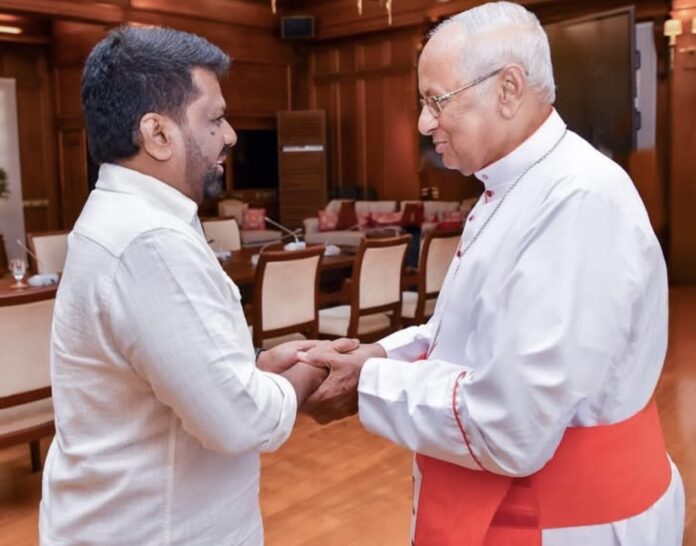By Adolf
Colombo (LNW): Sri Lanka is constitutionally a secular country with freedom of religion, but state resources are not meant to serve as private conveniences for clergy or institutions, no matter how influential. Reports suggest that Cardinal Ranjith receives military protection on a scale that far exceeds what is typically accorded to other religious leaders. The deployment of soldiers, vehicles, and security infrastructure comes at enormous cost to the taxpayer. When the government is pleading with citizens to tighten their belts, these expenditures cannot be justified without transparent criteria. Especially since the government arrested an ex president over $50000 spent on his security fir an overseas trip.
The question then arises: are other religious leaders afforded the same treatment? The heads of the Buddhist, Hindu, and Muslim communities certainly command respect, but none appear to enjoy the same degree of state-funded protection or diplomatic privileges. The apparent exception made for the Cardinal invites accusations of favoritism and selective application of public resources. Equality before the law, and parity in the treatment of all religions, is supposed to be a cornerstone of Sri Lanka’s governance.
Compounding the issue is the Cardinal’s own conduct. Far from being a strictly spiritual leader, he has been outspoken on political matters, regularly criticizing governments, lobbying on policy, and shaping public opinion. Of course, clergy have the right to express views, but when they choose to actively dabble in politics, they cannot simultaneously claim the entitlements of apolitical figures of worship. Political actors must play by the rules of politics, not enjoy state-funded privileges beyond accountability.
Equally contentious is the matter of the diplomatic passport. Diplomatic passports are normally reserved for government officials representing the state on official duty abroad. A religious leader, however prominent, is not a government servant and does not act in a sovereign capacity. Granting such privileges blurs the lines between church and state, raises questions of legal propriety, and sets a precedent that could lead other religious figures to demand the same.
There is no denying that the Catholic Church in Sri Lanka is an influential and wealthy institution with global connections and considerable assets. If the Church deems extensive security necessary for its leader, it is both financially capable and morally responsible to fund those arrangements from its own resources, rather than passing the bill onto taxpayers already struggling with inflation, taxes, and reduced public services.
This is not a matter of personal animosity toward Cardinal Ranjith, but of principle. Religious leaders exist to serve the people, not to be served by them through endless state-funded privileges. A legal determination is long overdue. Someone must take the matter to court to clarify whether such perks are constitutional, fair, and sustainable. The taxpayers of Sri Lanka deserve nothing less than transparency, equity, and the assurance that public resources are not being abused under the cover of religion.
